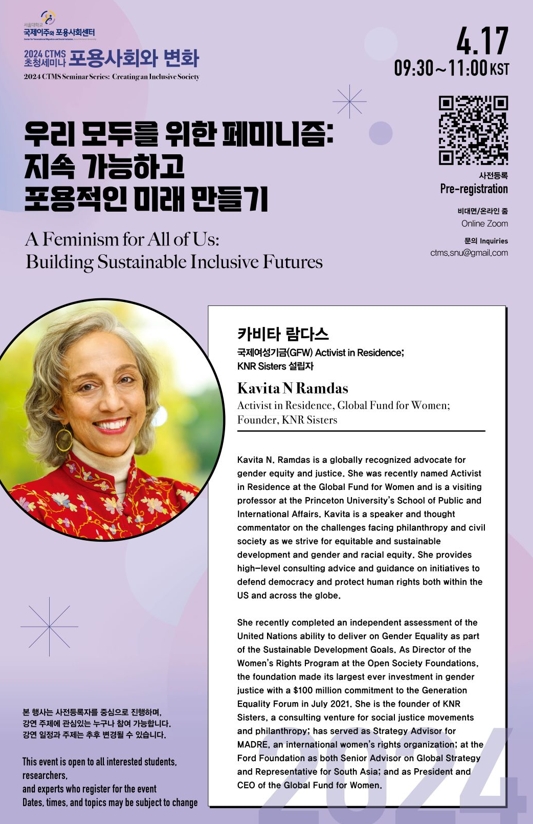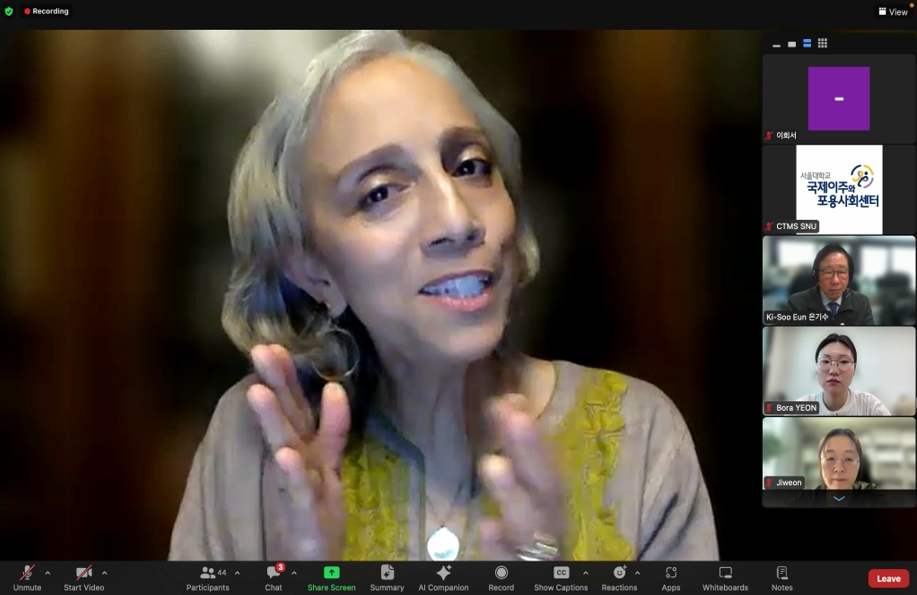On April 17, Seoul National University’s Center for Transnational Migration and Social Inclusion (CTMS) hosted the second seminar of its 2024 series, titled “A Feminism for All of Us: Building Sustainable and Inclusive Futures.” Affiliated with SNU Institute of International Affairs (IIA), CTMS brings together academics, civil society representatives, and field experts to ponder an ongoing question: How do we best achieve sustainable and inclusive development? While an exhaustive answer is yet to be given, one thing is clear: Gender equality, realized through feminism, is a cornerstone of all social, economic, and political progress.

“A Feminism for All of Us: Building Sustainable Inclusive Futures”
The guest speaker of this seminar was Kavita Ramdas, a world-renowned activist for gender equity and justice. With her significant leadership in various organizations that spearhead change in women’s rights, Ramdas’ contributions highlight intersectionality as the key to a better world for all.
Throughout her presentation, Ramdas outlined the “three Fs”—frameworks, feminist movements, and funding—as essential components in approaching feminism as a theory of change.

Kavita Ramdas on Feminism and the Achievement of Gender Equality
Frameworks and Resulting Blind Spots
Ramdas began with an anecdote of a visit that she made to a village in Northeast India to observe a program that was successful in its objective of generating income for the women of the community. By all means, the village women were making clear strides toward financial independence. Upon closer inspection, however, it became evident that there were more pieces to the picture.
Most notably, an overwhelming number of the female participants had bruised faces and bandaged limbs. Further conversations made it apparent to Ramdas that the doors opened by the increase in income came hand-in-hand with greater domestic violence in the community. The village men were upset that the money was not being handed to them and would physically abuse their female counterparts to pocket the sum for themselves. The young organizers of the program, despite having noble intentions, had neglected to engage the village men in the initiative so that they would better understand the changes resulting from it.
This particular example thus begins a larger conversation on frameworks. As stated by Ramdas, looking at situations from a specific, fixed framework–such as that of economic development–makes one blind to the side effects and repercussions that are unfolding right in front of our eyes. Thus, we must always ask ourselves the following questions: What are our unconscious biases and what are we blind to even if we mean well?
Intersectionality in Feminist Movements
The analysis of frameworks brought the seminar to a question that lies at the heart of all feminist debate–what is feminism? Ramdas defined feminism as “The idea that all human beings of all genders should live free of sexist exploitation and oppression.” To do so, one must undertake an intersectional understanding of what it means to be free of such oppression. Further quoting Ramdas, “The social theory of feminism must recognize that the fight for gender justice requires us to also fight for all forms of equality, dignity, and justice.” This entails a wholehearted belief in the following words uttered by Martin Luther King, Junior: “Injustice everywhere is a threat to justice everywhere.”
Ramdas emphasized that feminism and a commitment to gender justice must be an intrinsic part of our everyday lives, pervading our interpersonal relationships and conversations. The pursuit of equality does not begin with public rallies and spectacular gestures but in the intimate spaces that we call home.
A Re-evaluation of Foreign Funding
Delving into the final of the “three Fs,” Ramdas provided her perspective on the financial contributions made toward social change. Because of the hefty debt repayments and structural adjustments that come with development aid, the value of such foreign assistance must be further evaluated. The specific structural adjustments include significant cutbacks in food subsidies and expenditures on healthcare and education, with women and children bearing the brunt of these decisions.
Women’s rights, feminism, global development, and poverty are all inextricably linked to one another. As said best by Black feminist thinker Audre Lord, “We as women and we as all people don’t live single-issue lives, so we cannot fight single-issue struggles.” Therefore, as added by Ramdas, “there can be no single-issue solutions in achieving meaningful development or social change.”
Written by Hee Seo Lee, SNU English Editor, heeseolee@snu.ac.kr

